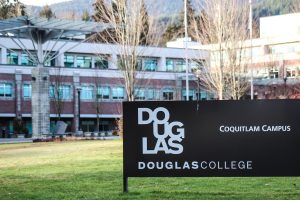
Metro Vancouver projected to increase by a million by 2050
By Katie Czenczek, News Editor
A recent report conducted by senior regional planner Terry Hoff estimated that the Metro Vancouver region will increase by a million people by the year 2050.
Posted on Metro Vancouver’s website, the report found that 2016’s population of 2.57 million people is projected to become 3.57 million in approximately 30 years. While the report did not specify the demographics of this estimated population, it does provide context for the kind of population increase Douglas College campuses will face in the upcoming years.
The Institution Accountability Plan and Report for 2017 to 2018 states that the college currently educates over 23,500 students yearly. This number includes those students taking part-time, full-time, and non-credit courses. International students make up 26 percent of annual course registrations according to the data.
When the report translated part-time and full-time students into full-time equivalent students, it was found that the college has 10,700 full-time equivalent students per year.
Interestingly enough, both the Metro Vancouver population projections and Douglas College’s demographic data for last year overlap when it comes to location. Surrey, which is expected to experience a major population increase over the next two decades, is the municipality that contributes the greatest number of Douglas students—24 percent of Douglas students are Surrey residents.
In fact, Surrey is the fastest-growing population in the Metro Vancouver region, and if it continues growing at its current rate, the city’s population will be merely a couple thousand short of the City of Vancouver’s population.
Despite the spiking population increase that is expected to occur, Douglas College’s data shows that the college is only expecting an estimated three percent increase in enrolment by 2027. Granted, the compiled data does note that this is dependent on economic, migrative, and social factors. Given what city planners are projecting, the college’s data may not fully acknowledge the expected increase.
The Institution Accountability Plan and Report also highlighted the areas where the college either met requirements or needed improvements for student spaces. Nursing and other Allied Health programs exceeded the target set by the college, while spaces for students in Developmental programs fell well below target by almost 200 spaces.
Considering the Anvil Centre expansion that took place last year, we might see campus expansions all over New Westminster and Coquitlam to account for the expected population growth. Even in 2017, Douglas College looked at 26 possible leases in order to provide more classroom and student spaces.
With accounting and business classes already filling up fast, it is hard to see what the future for the college will look like—especially when it is dependent on how many 18- to 24-year olds are moving to the Lower Mainland. It is, however, easy to guess that the college will need to brace for expansion: More classroom spaces, professors, and resources will be necessary in order to meet the region’s post-secondary education needs.



